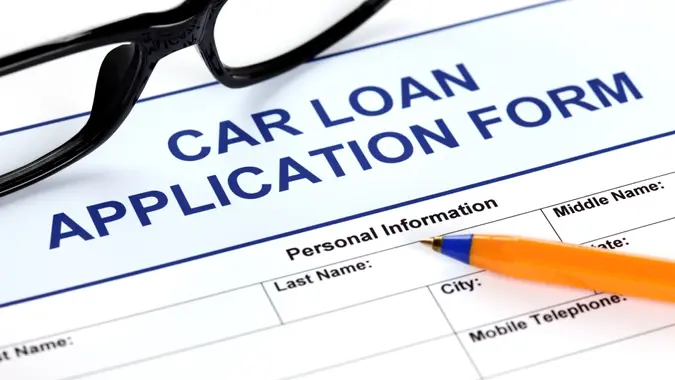20 Cities Where Millennials Have the Most Car Loan Debt

Commitment to Our Readers
GOBankingRates' editorial team is committed to bringing you unbiased reviews and information. We use data-driven methodologies to evaluate financial products and services - our reviews and ratings are not influenced by advertisers. You can read more about our editorial guidelines and our products and services review methodology.

20 Years
Helping You Live Richer

Reviewed
by Experts

Trusted by
Millions of Readers
According to a recent LendingTree study, 59.8% of millennials have auto loan debt with a median balance of $20,826. This makes them the generation with the second-highest auto debt, just behind Gen Xers, whose median balance is $23,260.
LendingTree’s study, which focused on 100 of the largest metropolitan areas in the U.S., found that millennials living in McAllen, Texas, had the highest amount of auto debt. Notably, most of the cities where millennial consumers have the highest amount of debt are in California and Texas.
These are the top 20 cities where millennials owe the most on their auto loans (ranked from least to most debt).
Also see five myths about debt that nobody should believe in 2024.
Baton Rouge, Louisiana
- Median balance: $23,152
- Percentage of millennials with auto debt: 58.5%
Oxnard, California
- Median balance: $23,296
- Percentage of millennials with auto debt: 58.6%
Oklahoma City
- Median balance: $23,376
- Percentage of millennials with auto debt: 63.7%
North Port, Florida
- Median balance: $23,426
- Percentage of millennials with auto debt: 61.3%
Phoenix
- Median balance: $23,539
- Percentage of millennials with auto debt: 60.3%
Riverside, California
- Median balance: $23,541
- Percentage of millennials with auto debt: 60.8%
Memphis, Tennessee
- Median balance: $23,550
- Percentage of millennials with auto debt: 57.2%
Augusta, Georgia
- Median balance: $23,880
- Percentage of millennials with auto debt: 62.7%
Dallas
- Median balance: $23,928
- Percentage of millennials with auto debt: 61.8%
Cape Coral, Florida
- Median balance: $24,191
- Percentage of millennials with auto debt: 65.9%
Bakersfield, California
- Median balance: $24,245
- Percentage of millennials with auto debt: 61.4%
Albuquerque, New Mexico
- Median balance: $24,264
- Percentage of millennials with auto debt: 60.6%
Lakeland, Florida
- Median balance: $24,369
- Percentage of millennials with auto debt: 62.4%
San Jose, California
- Median balance: $24,414
- Percentage of millennials with auto debt: 49.7%
Austin, Texas
- Median balance: $24,475
- Percentage of millennials with auto debt: 63.6%
Fresno, California
- Median balance: $24,821
- Percentage of millennials with auto debt: 54.5%
El Paso, Texas
- Median balance: $24,947
- Percentage of millennials with auto debt: 66.6%
Houston
- Median balance: $24,982
- Percentage of millennials with auto debt: 60.6%
San Antonio
- Median balance: $25,934
- Percentage of millennials with auto debt: 63.9%
McAllen, Texas
- Median balance: $30,700
- Percentage of millennials with auto debt: 68.2%
Ways To Pay Off Auto Loan Debt Faster
Born between 1981 and 1996, many millennials are well into their careers right now. Some are in their peak earning years, meaning now’s the time to start prioritizing paying down these debts. This is especially important of older millennials or of those who have other financial responsibilities — like saving up for their child’s college education or paying off a mortgage.
For millennials who want to pay down their car loan faster, here are some strategies.
- Make a new budget. Roughly 85% of consumers have a budget, according to Debt.com. But even if you have a budget, it never hurts to update it. After all, incomes and expenses change, as do financial goals. If you have a budget, go back to it and see whether you can make any changes to make tackling your debt easier.
- Pay more than the minimum amount. In addition to the monthly payments, set up a second monthly payment to reduce your debt faster. This new payment can be smaller, if need be. It can also be automated to ensure you make it regularly.
- Refinance if it makes sense. If your credit score has improved since taking on your original auto loan, consider refinancing for a lower interest rate. This can save you money in the long run. It can also lower your required monthly payment, freeing up some cash to make larger payments and pay down your debt sooner.
- Review the loan agreement. Check your loan agreement for any add-ons you can get rid of — like an extended warranty or, if your vehicle is paid off, GAP insurance. Depending on the terms, you may get a small refund for canceling these services. Put that money toward the principal.
- Trade in or downsize. Depending on your car’s value, trading it in for a cheaper one could make sense. Just make sure your next car is still reliable.
 Written by
Written by  Edited by
Edited by 

























